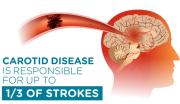
According to the Center for Disease Control and Prevention, heart disease remains the leading cause of death in the United States, claiming 647,457 lives in 2017 alone (the most recent data available). That is nearly 50,000 more than lives lost to cancer.
Heart Disease is Not a One Size Fits All
Cardiologist Dr. Kamleish Persad, DO, of Penn Cardiology at Somers Point explained there is no one-size-fits-all when it comes to who will develop coronary artery disease and who is likely to have a heart attack. “It is very difficult to predict exactly who will have a heart attack as everyone is different,” said Dr. Persad. “Heart disease remains responsible for at least one-third of all deaths in individuals over the age of 35. The best thing anyone can do is reduce or control your risk factors to decrease the chance that you will have a heart attack.”
Dr. Persad gave some sobering statistics, saying it is estimated that every 42 seconds someone will have a heart attack. He added that roughly 15.5 million people living in the United States have heart disease, and many of those people have been asymptomatic for years.
A Link Between Depression and Heart Disease
Mind and body-each play such a large part in influencing the other. Dr. Persad said there exists a two-way relationship between depression and heart disease. “Some literature shows that compared with people without depression, patients with depression have a higher risk of developing heart disease. And for those who already have heart disease, depression causes a higher likelihood of having a heart attack or dying from a cardiac cause,” said Dr. Persad. “Research suggests it is not only due to those who have depression possibly having a poor diet, sedentary lifestyle, and weight gain, which are independent risk factors for heart disease. The exact correlation between the two diseases is still unclear. It remains important to diagnose and treat depression and bipolar disorder early to help reduce the risk of heart disease later in life.”
What Brings Patients to the Cardiologist
Chest pain and shortness of breath are the most common complaints that patients have when they come in for an office visit, according to Dr. Persad. He added, “Not everyone experiencing chest pain or shortness of breath necessarily has a problem with their heart. That’s why it is so important to discuss your symptoms with your doctor and have a complete physical exam, which can point out whether or not there is a heart problem.”
Risk Factors
According to Dr. Persad, many of the risk factors are the same for men and women, but women do have some unique risk factors. “Early menopause can put women at an increased risk of heart disease. Certain oral contraceptives can be associated with an increased risk of heart attack and stroke,” said Dr. Persad. “And then there are many pregnancy-related complications such as gestational hypertension, gestational diabetes and preeclampsia that can create a greater risk of women developing heart disease.”
Women with coronary heart disease are generally 10 years older than men at the time they present with symptoms, according to Dr. Persad. Some women will have heart attacks without the normal chest pain experienced by men.
Do Calcium Supplements Cause Heart Disease?
Longstanding elevated calcium levels can cause a buildup of calcium on your heart valves and coronary arteries. However, Dr. Persad said there are currently no guidelines to suggest we should be screening patients who have an elevated calcium level for heart disease. “If you are found to have an elevated calcium level, the more important thing is to determine the cause and treat it,” said Dr. Persad.
He continued, saying there were some studies suggesting there was a relationship between calcium supplements and heart disease said Dr. Persad. However most of the randomized trials did not show a clear association between them. In fact, patients who have bone disease usually take calcium supplements. Patients with bone disease have the same risk factors for heart disease such as a more sedentary lifestyle and a history of smoking which are also some risk factors for heart disease. So currently there is not strong evidence that calcium supplements definitively cause heart disease.
Help Yourself- Use Life’s Simple 7
The American Heart Association has seven metrics it suggests to promote a healthier heart. Dr. Persad said these simple seven metrics everyone should follow to decrease their chance of developing heart disease, and to follow if they are already diagnosed with heart disease. “That is why it is so important to discuss your symptoms with your doctor and have a complete physical exam which can help to determine whether or not there is a heart problem. This is the best advice I can give to any patient,” concluded Dr. Persad.
- Stop smoking
- Be more physically active
- Have a normal blood pressure
- Have a normal blood glucose level
- Have a normal total cholesterol level
- Be a normal weight
- Eat a healthy diet
To make an appointment with Dr. Kamleish Persad DO at Penn Cardiology-Somers Point office located on the second floor at 155 Medical Center Way in Somers Point call 609-365-3100.










